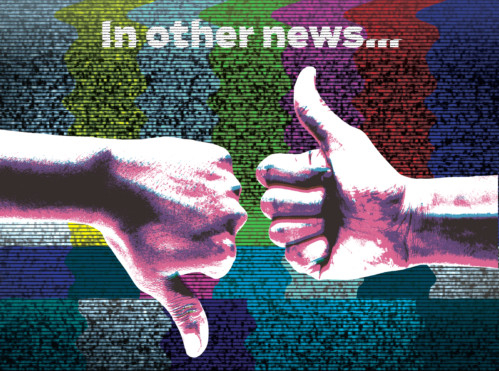
Dwindling
Readers are shifting from media houses to individual reporters
I would say that trust in traditional media is decreasing and people are shifting more and more to trusting individuals such as bloggers or individual journalists within bigger publications. But in general I would say people are overloaded with information, including fake news, so they’re trying to consume less media when they can. However, in most cases nowadays it is not really a choice whether you want information or not.
Consumers shifting from media houses to individual reporters is risky for big media corporations. The truth is, now it’s harder than ever to win the trust of the reader and I think only big corporations would survive such as the New York Times or Washington Post. As for the rest, they begin counting more and more on social media to attract audience and maintain it.
So, social media is becoming a middle man between media and the readers. It will become more and more important. We can see it now - people go to social media first before traditional news websites to get their information.
From Mr Krassimir Yankov
Freelance journalist living in Bulgaria
Alternative news
Flood of news sources dilutes credibility
I think trust in media is decreasing because currently there are tens of thousands of sources. Not all of them can be reliable. Most of the news we get is on the internet and on the internet, click bait is common. In an age where people make money by sitting at home or an office creating content for the internet, it is pretty obvious that they’ll need traffic on their content to earn a decent amount.
Facebook is usually where people will hear the news and all source pages want one thing – clicks to their website. They will blow the headline of the news article out of proportion to attract attention but when you read what’s in it, it’s not as great as we would have thought it to be. Engagement is what the media looks for and they will do what they can to get it in a way that is subtle enough to get away with.
Also, some of the media is heavily influenced by outside parties paying them to show and tell people only half-truths or favourability.
As for readers, the average person wouldn’t really mind if the temperature was a couple degrees off because they aren’t planning their day around the exact temperature, it’s not that big a deal. So, verifying every bit of information they get wouldn’t really be all that important, would it?
It is news that needs to be accurate. People want to know exactly what happened in a situation since they can’t be there to witness it. News is what should be helping them with that.
While some media outlets do exactly that, the flood of alternative news channels is watering it down. It’s going to take a while to find the right source and check if it’s real or not.
News should be instant, current and accurate. No one wants to proof check if they have things to do.
From Ms Abeer Rahman Seddiqi
Student and ‘netizen’ living in Sharjah
Reliability
Social media makes it difficult to confirm accuracy of news
The trust in media is decreasing. Generally, I feel there are too many avenues these days for ‘news’ and, with most of them, you don’t know whether they are credible sources or not. It is difficult to tell, especially when social media, particularly Twitter, seems to go out of control.
Let’s say, for example, an influencer tweets a ‘news’. If he has millions of people following him, suddenly people will start retweeting and the ‘news’ goes out of control.
As for news outlets, I guess it would be looked at more credibly and there would be more public trust, unless you are looking at topics like the US President Donald Trump – you can expect CNN to say one thing and Fox News to say something else.
Not everyone goes around checking news and everyone is opinionated these days … opinions are free.
But I don’t think the problem with credibility is because opinions have somehow become more important than facts. It is more to do with the fact that in terms of finding a credible source, people wouldn’t have the time to research. How much a person trusts established news organisations would vary and also definitely depend on how much freedom the press has.
Another place where sources and credibility are an issue is online resources like Wikipedia. Everybody thinks that Wikipedia is authentic but it is basically written by you and me. Even I could go and edit any article, so it isn’t necessarily accurate. There is a whole lot of information online, but which is accurate and which isn’t is hard to find. This is affecting people’s trust.
From Mr Praveen Pinto
Director of digital marketing at a Dubai-based firm
As a media consumer, for me credibility is extremely important. I would rely upon a good media house provided it hasn’t gotten into any kind of negative issues in terms of veracity or truthfulness of its content.
The younger generation as well as the average person seem to be consuming a lot of information from social media whereas veteran media consumers always have their own set of verification tools and they make the effort to find out whether to trust the information or not. At the same time, reputed brands that we take for granted cannot afford to miss on verifying all the facts before they share the information with the public because, in general, the habit of verification is corroding simply because the sense of intellectual curiosity and the need to investigate facts when you come across them isn’t common.
It’s a personal trait, for sure, but collectively, I feel it has reduced. Unfortunately, I think it will continue to dwindle because of the information blitzkrieg that we are subjected to on a daily basis.
Also, whether you want to call it alternative facts or fake news, opinions have somehow become more important than facts. I don’t know if the media consumer base is increasing or not but social media or new media channels are definitely seeing a growth in consumers. These alternative channels have started streaming in a lot of information and irrespective of the authenticity or quality of the ‘news’, it gets consumed. Invariably there is very little fact-finding that takes place. It just isn’t part of the attitude of the media consumer.
Even with conventional media, the reputation of the entity matters a lot. How credible your news reports are would affect your brand equity. However, that seems to be decreasing simply because of the amount of new media. It is a matter of quantum getting itnot he mainstream users is comartaively higher.
Social media platforms and Whatsapp are becoming more popular than established new media houses. So, news has become more of a collection of comments, rumours become news, and propaganda spreads when it just has a figment of a fact. Across the world, teams are working on these kinds of content.
It is matter of quantity – the quantity of alternative emdia sources is just to much and in the process, even fiction could become fact. Everything is treated as information, no matter how distorted.
This is quite dangerous and sad from a public perspective. The situation is quite precarious and it would take time to weed out all the unreliable sources. Governments need to be involved and regulartory authorities need to come down hard on the spread of misinformation.
Germany last week issued a law criminalising hate speech on social media, for example. Such a step would make a difference. Even India is taking steps against hate speech and intolerance and the UAE is doing a wonderful job on this front, as it is always proactive in this regard.
But comparing that to the situation in the rest of the world, we need to find out how we can control the bigger picture for the course of the common good.
From Mr Reuben Smile
Avid media consumer and communications specialist based in Dubai
— Compiled by Huda Tabrez/Community Web Editor
Gulf News asked: How much do you trust the media?
Not at all 16%
Not very much 49%
A good amount 31%
A great deal 4%
















